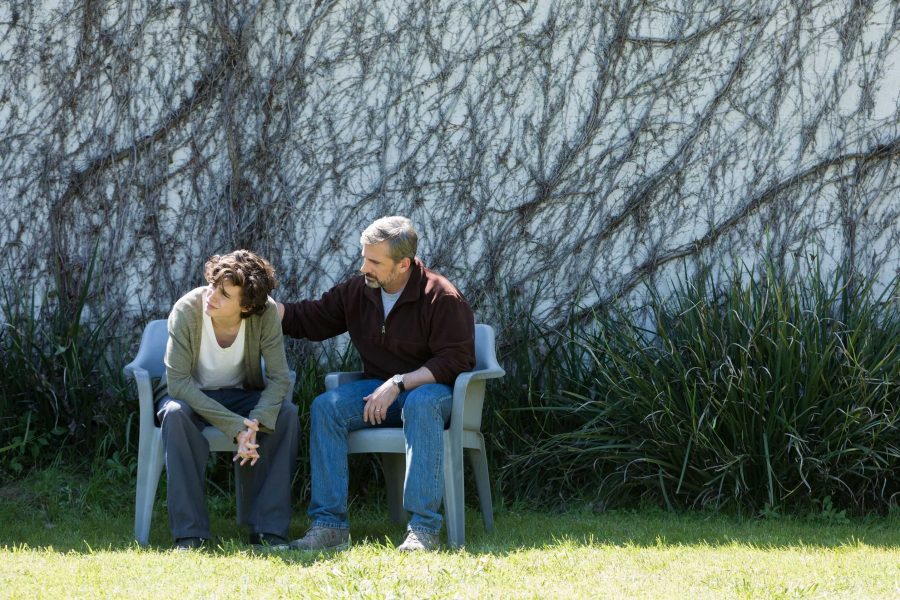Review: “Beautiful Boy” displays drug addiction with raw authenticity
November 13, 2018
Beginning the long road to recovery from addiction is an unbelievably grueling process often attempted on-screen, but “Beautiful Boy,” directed by Felix van Groeningen, brings a new and brutally realistic perspective on drug addiction and the difficulty of obtaining sobriety. “Beautiful Boy” is intentionally flawed and firmly aims to illustrate this unbearable pain with raw and haunting power. The film has a refreshingly matter-of-fact quality with a clear introduction, displaying the intent that this story is not going to be sugar-coated.
“Beautiful Boy” exquisitely represents both sides of a heart-wrenching story. This film is loosely based off of an autobiography, “Tweak” by Nic Sheff. The novel explores the highs and lows of drugs through the eyes of an addict. “Beautiful Boy” presents not only the perspective of a drug user but of his loved ones who are seeing his life crumble. The film’s blend of two separate memoirs displays two sides of the same story and presents a new angle of a common family tragedy to the world of showbiz. The audience follows the perspectives of a boy, Nic Sheff (Timothée Chalamet), who is drowning himself in methamphetamines, while his father, David Sheff (Steve Carell), is trying to figure out how to both cope with and understand the world of drugs which he is losing his son in.
The film begins with a lens into the life of David when he is seeking help for Nic’s drug addiction. David is plagued by the “why”; why did this intelligent, amiable and genuine boy, find himself drowning in drugs and losing who he used to be? As many parents feel when they are put into this position, all they want is their child back.

All the while, Nic is falling deeper and deeper. The person his dad once knew is now a ghost. His love for writing, art and music are replaced with a continuous high. Numbing himself becomes his only purpose. David soon discovers that Nic has been abusing crystal meth, and nothing could be more devastating than to hear his son say “my life went from black and white to technicolor.” Surfing together, jamming out to Nirvana in the car, taking on life as an adventure, being each others’ rock, whispering “everything” into each other’s ear everytime they parted were the little things David cherished, and those were the things he thought he’d never have to say goodbye to.
Nic’s addiction is broken up by periods of sobriety but the moment he seems to regain control, he loses it all over again. David struggles with balancing his own sanity with saving his son from what seems like an impending death. David flashes back to Nic’s early childhood, trying to see where his parenting went wrong. David realizes that he can’t save his son from the inner demons that plague him. He can’t fix him. He has to let his “beautiful boy” go.
Whether you can relate to it or not, this story will surely touch the hearts of many and bring awareness to an epidemic that is claiming the lives of thousands of people annually. Substance abuse plays a part in many people’s lives. The authenticity of David and Nic’s situation causes the audience to feel an emotional connection to the film; this is the exact power of the film. It is the true story of an addict—there are no ingenuine plots, which erases Hollywood’s desire to play up the drama in substitution for the raw and brutal truth. The simplicity of the story doesn’t take away its emotional appeal.
The film is filled with gut-wrenching acting from start to finish. Timothée Chalamet and Steve Carell give especially remarkable performances that are sure to spark award-buzz. Chalamet’s fearlessness enabled him to climb into the skin of Nic Sheff and embody the living hell of an addict while Carell takes on a role which is unlike anything he’s done before. His ability to play such a complex character who finds himself so deeply lost throughout the film proves his talent as an actor.
Credit: Amazon Studios / YouTube
With a 69% on Rotten Tomatoes and 7. 3/10 on IMDb, the film is given a bad rap for the seemingly never-ending hamster wheel of recovery and relapse. However, the purpose of this movie was not to take the form of the stereotypical drama with plot twists and thrilling effects; the reiteration of Nic’s journey sheds a light on how exhausting the struggle is for drug abusers by intentionally giving the audience a repetitive feel. The movie’s intentions were to expose the harsh reality of drug abuse, specifically that of the real Nick and David’s battle.
The film gave us the reality check we needed, and there couldn’t be a film more essential for those involved in drug abuse and those who know drug addicts. The looping cycle of this film makes “Beautiful Boy” all the more powerful; the exhaustion of repetition, the power of recovery and the devastation of relapse are what shine the cold truth of drug addiction.
“Beautiful Boy” was a transparent, compelling and emotionally raw film that brought a new angle to a highly talked about yet highly controversial topic. The strong and committed performances from Carell and Chalamet, along with the devastating reality of drug addiction, carry an emotionally intense film. Every little thing the movie presents has brought a rare authenticity to the big screens. “Beautiful Boy” demonstrates that people who are going through this nightmare aren’t alone and with “everything” comes hope.
Hint: bring tissues! It’s painfully hard to watch, but that is why it touches our hearts.
Disclaimer: Viewer discretion is advised, for the film has some gruesome scenes containing needles and drug use, along with graphic and disturbing scenes of overdose and sexual content.















